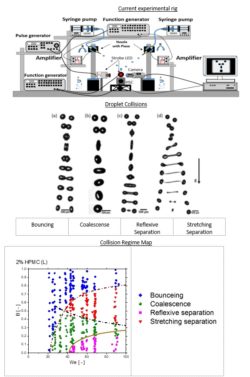Droplet Collision Dynamics
- Academic lead
- Andrew Bayly (Chemical and Process Engineering)
- Co-supervisor(s)
- Nik Kapur (Mechanical Engineering)
- Project themes
- Energy and Transport, Environmental Flows, Industrial Processes, Other: Multi-phase, free surface
Droplets are a fascinating and challenging area of fluid dynamics. Their interactions with each other, with surfaces, films and particles, are important to numerous natural and industrial processes, from atmospheric aerosols to additive manufacturing, and even have relevance for transmission of infectious diseases! Yet, whilst they have received much academic attention in the past, the field remains very active, with ongoing advances in both computational and experimental capability enabling significant improvements in the understanding of these systems
This project will use recently develop experimental techniques to develop a better quantitative understanding of droplet–droplet collisions of non-identical droplets and droplets with complex material properties. The droplet collision behaviours depend on the both the collision velocity/geometry and on the droplet properties, e.g. size and material properties. In recent years, we have developed experimental capability and made progress in quantifying and understanding the behaviour of these collisions as some of these variables are changes [1,2] , however there remains much more to explore and understand in the area. Amongst which size changes and post-collision dynamics of the droplet remain unreported and are of great theoretical and practical interest. It is anticipated the project will be experimentally based, using and developing the existing experimental rig; and building new capability to probe particular aspects of behaviour and extend the range of material properties that can be explored. The project scope is intentionally broad and will allow the researcher room, with the guidance of supervisors, to focus on areas that intrigue and fascinate them!
Whilst of significant academic interest, the data produced will also be invaluable for the development and validation of models for industrial and environmental application.
1: Al-Dirawi, K.H. and Bayly, A.E., 2019. A new model for the bouncing regime boundary in binary droplet collisions. Physics of Fluids, 31(2), p.027105.
2: Al-Dirawi, K.H. and Bayly, A.E., 2019. An experimental study of binary collisions of miscible droplets with non-identical viscosities. Experiments in Fluids, 61(2), 50.

